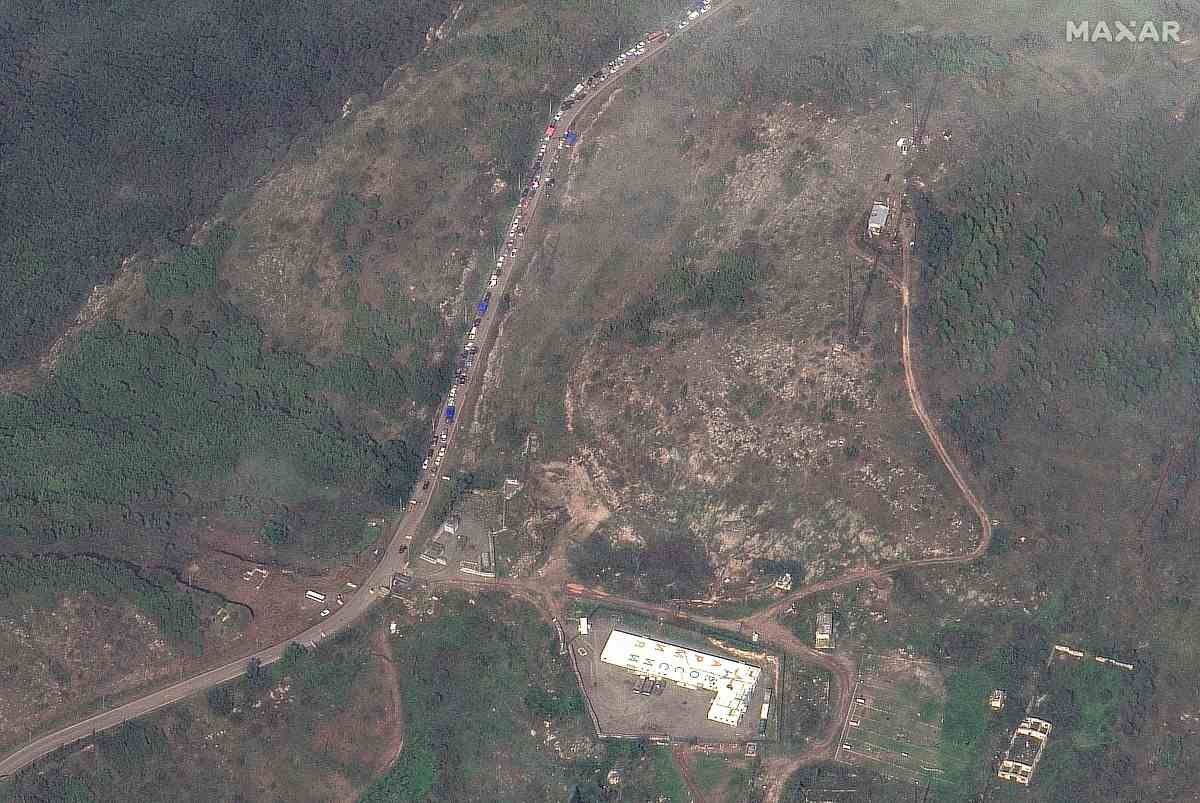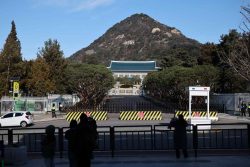
A satellite image shows a long traffic jam of vehicles along the Lachin corridor as ethnic Armenians flee from the Nagorno-Karabakh region, September 26, 2023.
12:41 JST, September 27, 2023
NEAR KORNIDZOR, Armenia (Reuters) – Hungry and exhausted Armenian families jammed roads on Tuesday to flee homes in the defeated breakaway enclave of Nagorno-Karabakh, a departure blighted by an explosion at a fuel depot that killed dozens and injured more than 100.
The crisis prompted the U.S. Agency for International Development (USAID) to announce that Washington would provide $11.5 million in humanitarian assistance.
“We urge continued humanitarian access to Nagorno-Karabakh for all those in need,” White House National Security Council spokesperson Adrienne Watson said.
Azerbaijan launched a lightning operation to take over Karabakh last week. A top Azeri official said at talks in Brussels that his country had no intention of taking further action to create a land corridor through Armenia itself.
PEOPLE FLEE IN TRUCKS, TRACTORS, CARS
The Armenians of Karabakh – part of Azerbaijan that had been beyond Baku’s control since the 1991 dissolution of the Soviet Union – began fleeing this week after their forces were routed in the operation by Azerbaijan’s military.
The Armenian government said more than 28,000 of Karabakh’s 120,000 ethnic Armenian residents had already crossed into Armenia. Hundreds of cars and buses crammed with belongings snaked down the mountain road out of Azerbaijan.
Some fled packed into the back of open-topped trucks, others on tractors. Grandmother-of-four Narine Shakaryan arrived in her son-in-law’s car with six people packed inside. The 77 km (48-mile) drive had taken 24 hours, she said. They hadn’t eaten any food.
“The whole way the children were crying, they were hungry,” Shakaryan told Reuters at the border, carrying her three-year old granddaughter, who she said had become ill during the journey. “We left so we would stay alive, not to live.”
Fuel stations were thronged on the way out of the Karabakh capital, known as Stepanakert by Armenia and Khankendi by Azerbaijan.
Karabakh’s ombudsman said the death toll in the explosion and fire at a fuel depot on Monday had risen to 68, with a further 105 people missing and nearly 300 injured. A total of 68 were taken to medical institutions in Armenia.
The authorities have given no explanation for the blast.
USAID head Samantha Power, in the Armenian capital Yerevan, called on Azerbaijan “to maintain the ceasefire and take concrete steps to protect the rights of civilians in Nagorno-Karabakh.”
Power had earlier handed Armenian Prime Minister Nikol Pashinyan a letter of support from U.S. President Joe Biden. She said Azerbaijan’s use of force was unacceptable and that Washington was looking at an appropriate response.
Power urged Azerbaijan’s President Ilham Aliyev to honor his promise to protect ethnic Armenian rights, fully reopen the Lachin corridor that connects the region to Armenia and let in aid deliveries and an international monitoring mission.
Aliyev has pledged to guarantee the safety of Karabakh’s Armenians but said his iron fist had consigned the idea of the region’s independence to history.
“It is absolutely critical that independent monitors as well as humanitarian organizations get access to the people in Nagorno-Karabakh who still have dire needs,” Power later said during a visit to the village of Kornidzor on the Azeri border.
She said she had heard “very troubling reports of violence against civilians. At the same time given the chaos here and the trauma, the gathering of testimonies … of the people who have come across is something that is just beginning.”
‘NOWHERE TO GO’
Ethnic Armenians who managed to get to Armenia have given harrowing accounts of fleeing death, war and hunger.
Some said they saw many dead civilians – one said truckloads. Some with young children, broke down in tears as they described a tragic odyssey of running from war, sleeping on the ground and with hunger churning in their bellies.
“We took what we could and left. We don’t know where we’re going. We have nowhere to go,” Petya Grigoryan, a 69-year-old driver, told Reuters in the border town of Goris on Sunday.
Reuters was unable to independently verify accounts of the military operation inside Karabakh. Azerbaijan has said it targeted only Karabakh fighters.
The Azerbaijani victory changes the balance of power in the South Caucasus region, a patchwork of ethnicities crisscrossed with oil and gas pipelines where Russia, the United States, Turkey and Iran are jostling for influence.
Since the breakup of the Soviet Union, Armenia had relied on a security partnership with Russia, while Azerbaijan grew close to Turkey, with which it shares linguistic and cultural ties.
Armenia has lately sought closer ties with the West and blames Russia, which had peacekeepers in Karabakh but is now preoccupied with the war in Ukraine, for failing to protect Karabakh. Moscow denies blame and has told Pashinyan that he is making a big mistake by flirting with the United States.
Aliyev hinted on Monday at the prospect of creating a land corridor to Turkey across Armenia. Turkey’s President Tayyip Erdogan, who met Aliyev on Monday, said on Tuesday such a corridor must be completed.
But Hikmet Hajiyev, Aliyev’s foreign policy adviser, told Reuters in Brussels that Azerbaijan only wanted to create transport links to the country’s enclave of Nakhchivan through Armenia. And that would benefit both countries, he said.
"News Services" POPULAR ARTICLE
-

American Playwright Jeremy O. Harris Arrested in Japan on Alleged Drug Smuggling
-

Japan’s Nikkei Stock Average as JGB Yields, Yen Rise on Rate-Hike Bets
-

Japan’s Nikkei Stock Average Licks Wounds after Selloff Sparked by BOJ Hike Bets (UPDATE 1)
-

Japan’s Nikkei Stock Average Buoyed by Stable Yen; SoftBank’s Slide Caps Gains (UPDATE 1)
-

Japanese Bond Yields Zoom, Stocks Slide as Rate Hike Looms
JN ACCESS RANKING
-

Keidanren Chairman Yoshinobu Tsutsui Visits Kashiwazaki-Kariwa Nuclear Power Plant; Inspects New Emergency Safety System
-

Imports of Rare Earths from China Facing Delays, May Be Caused by Deterioration of Japan-China Relations
-

Tokyo Economic Security Forum to Hold Inaugural Meeting Amid Tense Global Environment
-

University of Tokyo Professor Discusses Japanese Economic Security in Interview Ahead of Forum
-

Japan Pulls out of Vietnam Nuclear Project, Complicating Hanoi’s Power Plans

























